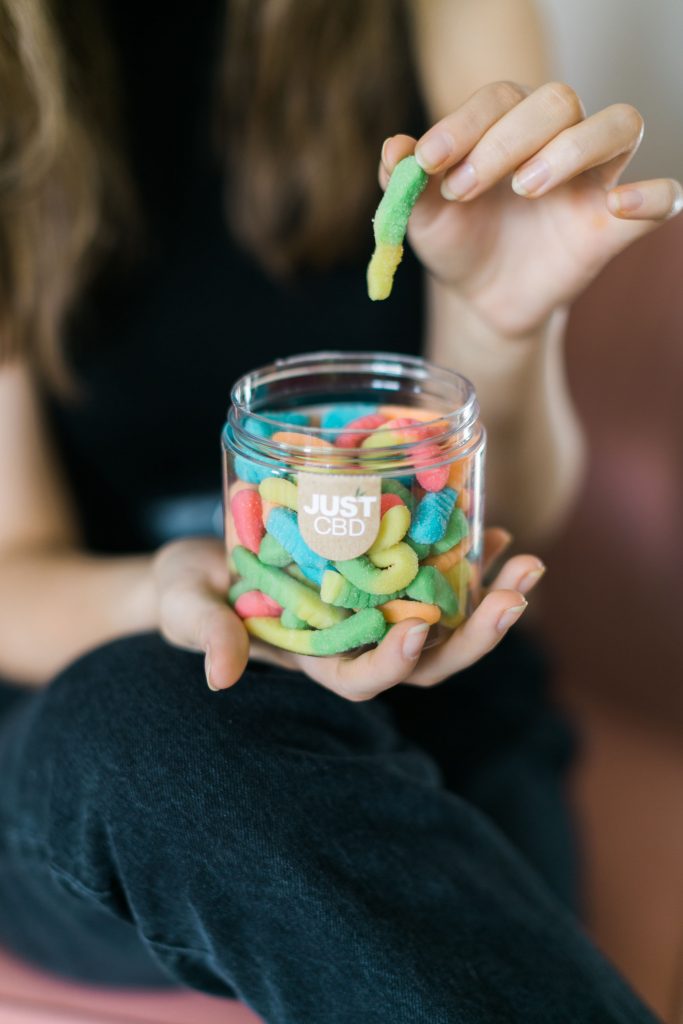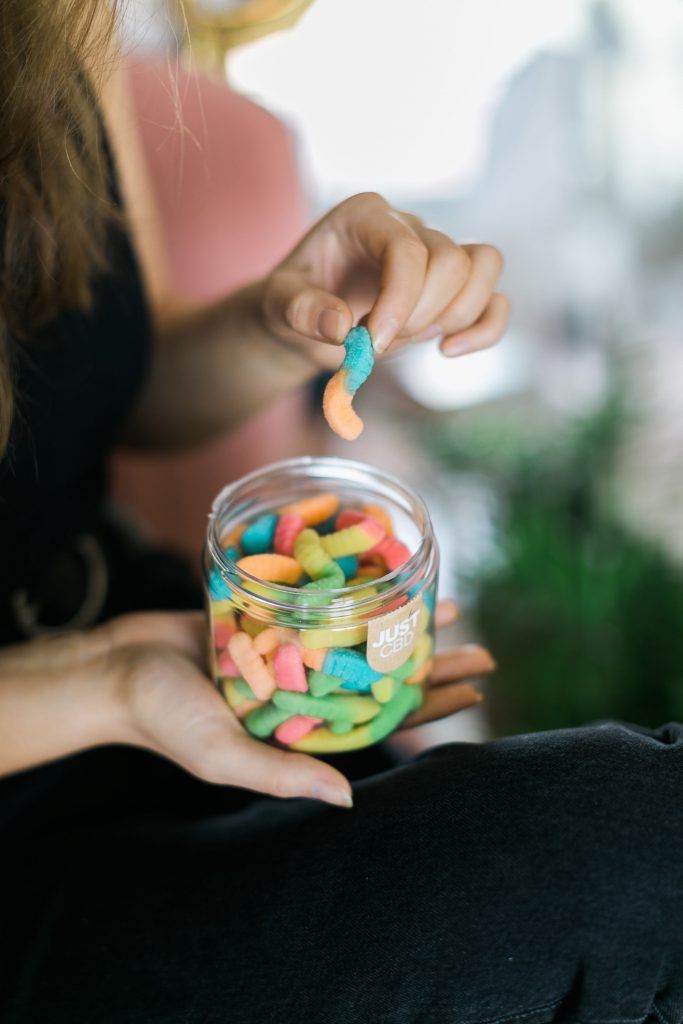CBD Gummies as a Treatment Option
CBD has been determined to be a safe treatment option for users by doctors across the globe. CBD gummies are an effective way to ingest CBD daily and manage dosage and potency. While there are not yet a lot of studies that prove efficacy of CBD and mental health conditions, there exists plenty of anecdotal evidence and early signs of scientific evidence in the research that has been completed to date. So how does CBD treat common ailments such as stress? What about anxiety and depression? Does it help with insomnia? How about chronic pain? Let’s dive into some science and research to better understand how JustCBD Gummies can work for your body.

What is Stress?
Stress is a physical response to external stimuli, for example, a deadline at work, a fight with your partner, or running late for a family event. The body’s reaction to stress is called allostasis. Treating stress is usually simply by dealing with the external cause, for example, completing the deadline, making up with your partner, or arriving at the family event and apologizing for being late. Typically, once this action is completed, the stress will dissipate and your body will return to homeostasis. We run into difficulties when we are unable to immediately deal with the stress and it begins to build up.
What Happens In Your Body When You Experience Stress?
When we experience stress, a series of events occur in our endocrine system beginning with the hypothalamic-pituitary-adrenal (HPA) axis. This is a very complicated way of saying that the hypothalamus, a small region of the brain near the pituitary gland that connects the brain and the endocrine system, sends a signal to the pituitary gland to produce a hormone. This hormone signals the adrenal glands, which are above the kidneys, to increase the production of cortisol, also known as the “stress hormone”. Cortisol levels exist in our bodies throughout the day at varying levels as part of normal functioning. It’s usually highest upon waking and throughout the day it depletes until bedtime. During a period of stress, however, cortisol peaks in order to give us energy to deal with the problem. When we become over-stressed, the cortisol levels do not regulate and this can cause problems throughout the entire body. During an acute stress attack, the following things occur within the body:
- Our airway widen in order to allow more oxygen into our lungs
- Our heart rate increases so nutrients and oxygen can go faster and deeper into our muscles
- Our liver pumps glucose into our bloodstream for a boost of power to our body
- Our digestive and immune systems shut down so our body can focus on our muscles and brain instead
- Norepinephrine, a stress chemical, is released to stimulate our brain and heighten awareness
Given all of these processes that take place in an acute stress attack, you can see why managing stress is one of the most important things we can do to stay healthy.
How do CBD Gummies Help Relieve Stress?
As we’ve discovered, CBD (cannabidiol) interacts with the endocrine system and the endocannabinoid system. Endocannabinoids bind to cannabinoid receptors, known as CB1 and CB2, throughout the body in the brain, central nervous systems, immune system, and organs. This process helps your body maintain homeostasis and health. Essentially, your endocannabinoid system acts as a safety net to prevent your body from becoming ill as a result of external stressors by regulating the response to fear, stress, and anxiety.
In essence, endocannabinoids are molecules that change the activity of cells when necessary. All of those stress processes mentioned above need to be reversed when the stressor is managed. Meaning, we stop producing stress hormones like cortisol, our heart rate slows and blood pressure returns to normal, and our digestive and immune systems become activated once again. When this is completed, we’ve returned to our homeostasis. When CB1 receptors within the brain and central nervous system are activated, the body experiences a feeling of calm. Keep in mind that this is only specific to CBD, not THC, which can actually increase feelings of anxiety. Ingesting CBD Gummies helps produce the endocannabinoids necessary for our endocannabinoid system to fight off the extra stress within our body. How? Well, in very basic terms, the primary player in stress is the hypothalamus. When the hypothalamus senses cortisol peaks, it sends signals to shut them down. The more frequently we experience peaks, the more cortisol is required to set the alarm off. Basically, the hypothalamus becomes so used to the higher levels of cortisol that it requires even more stress for it to respond. This is what we know as chronic stress. CBD helps the hypothalamus to sense the cortisol. It amplifies the receptors and our body begins the process of shutting down the flight or fight response. This is when we begin to experience that feeling of calm.

What is Anxiety?
Anxiety can be easily confused with stress, however it is very much a horse of a different color. Unlike stress, anxiety is a mental health disorder that can be chronic or acute. While stress is often resolved once you complete the activity causing the stress, anxiety lingers regardless of task completion, and the continuing feeling of dread and apprehension remains. In layman’s terms, stress is feeling under pressure, while anxiety is feeling fearful, uneasy, or worried. If you’re removing stressors yet you’re still feeling helpless, chances are you’re suffering from anxiety. Stress and anxiety are treated very differently, however CBD can assist with both and there is burgeoning research that suggests CBD can be very effective against anxiety disorders.
How do CBD Gummies Help Relieve Anxiety?
As a molecule, CBD is very good at binding to neurotransmitter receptors in our brain. Gamma-aminobutyric acid, or GABA, is an amino acid neurotransmitter that is naturally occurring. It is referred to as an inhibitor because it blocks certain brain signals and decreases the activity in our nervous system. That feeling of calm after you deal with a stressor is GABA at work. Like with all chemicals making up our bodies, not everyone is capable of producing the amount needed for a healthy state. Low levels of GABA are present in people with:
- seizure disorders
- ADHD
- anxiety
- panic disorder
- mood disorders, such as depression
Medications like Gabapenton and Pregabalin are classified as GABA Analogs because they increase communication with the GABA neurotransmitters to decrease the fight or flight processes in our bodies. When suffering from anxiety, your body is experiencing continuous stimuli through the hormones and signals being communicated throughout your body. CBD binds to these receptors and acts as an off switch so that your body can begin to return to its natural state. Enjoying CBD gummies on a regular basis will increase the level of cannabinoids in your system, which in turn, can help ease anxiety. As mentioned previously, if you are taking medication, please consult with your physician first to ensure there are no interactions with CBD. And remember, we don’t yet know enough about CDB to be able to use it as a curative, only a treatment.

What is Pain?
There are two main types of pain that we experience as humans: Nociceptive and neuropathic.
Nociceptive Pain
Nociceptors are little pain receptors located all throughout your body. When they are stimulated by trauma, you experience the physical feeling of pain. The nociceptors signal the damage to your body to your brain and your brain alerts you to injury.. For example, when you step on something sharp, the nociceptors react to the trauma and send signals to your brain that cause you to pull away from the danger and react to the feeling of pain. These receptors are involved in both acute and chronic pain responses
Neuropathic Pain
Neuropathic pain occurs when there is a misfiring or miscommunication within your nervous system. It can be the result of nerve damage, spinal cord damage, illness such as Shingles, or even brain damage. Neuropathic pain is often chronic in nature but can be experienced acutely, for example, a cold breeze on your face could elicit a pain response in your system.
Acute Pain
Acute pain is the easiest to diagnose and understand. We experience an event and as a result we experience corresponding pain. Once that area is healed, the pain is gone. For example, while hammering a nail we miss the nail and hit our thumb with the hammer. Once the thumb is healed, we no longer experience pain in our thumb.
Chronic Pain
Pain is classified as chronic when it remains at least six-months after an injury, or if pain exists for at least three-months without a noticeable cause. Chronic pain is insidious and it’s estimated that roughly 50 million adults suffer from chronic pain in the US alone. Chronic pain can be caused by a previous injury, degenerative conditions like arthritis, or nerve damage.
What Happens In Your Body When You Experience Pain?
When we experience pain, we’re actually dealing with an inflammatory response. When an area of our body is injured, our immune system sends blood flow to the area and begins to fight off the perceived threat in a cascade of events to shield the rest of the body from that threat. This is why we experience redness, heat, and swelling when we get hurt. In a healthy body, the body will respond to the threat, and then recognize when it’s over and begin to return to homeostasis by releasing anti-inflammatory compounds to heal and relax the body. There are all sorts of triggers that can cause our bodies to go into the inflammatory response process such as allergies, environmental threats, disease, and even stress. In a healthy body, the brain signals the immune system to begin fighting the threat, and then signals it to stop fighting by releasing the anti-inflammatory molecules beginning the healing process. When our brain no longer knows when to turn off the inflammatory response, that is when we enter the realm of chronic pain and where CBD can really help.
How Do CBD GUMMIES Help Relieve Pain?
People who suffer from chronic pain experience a disconnect between the inflammatory and anti-inflammatory response. CBD molecules are naturally anti-inflammatory and this is why they can help relieve pain.Similar to NSAIDs like ibuprofen or acetaminophen, CBD acts on inhibiting the prostaglandin enzyme that is responsible for making your body more sensitive to certain types of pain. Essentially, prostaglandin makes pain receptors more sensitive and CBD naturally dulls these receptors. There is still a lack of research in the effectiveness of CBD and certain pains, for example, sunburns, however there is a lot of promising science for treating other widespread pain such as arthritis, menstrual cramps, migraines, and nerve pain. One of the greatest benefits of using CBD gummies for pain is that they’re non-addictive and have few, if any, side effects. They are also long-acting so you can manage pain effectively for hours.

What is Nausea?
Nausea can be triggered by many things from illness, poisoning, or even pain. The process of nausea originates in the small region of the brain called the medulla oblongata. The medulla oblongata is responsible for regulating many of our autonomic functions such as breathing, sneezing, and well, vomiting. Vomiting is a safety response built into our bodies to purge our digestive tract of poisonous substances (alcohol or spoiled food, for example), infectious agents like bacteria or viral infections, and sometimes mistakenly from abnormal neurological activity due to conditions like migraines or brain tumors.
How Do CBD Gummies Help Relieve Nausea?
Just like with sleep, CBD can help relieve nausea by also relieving the cause of it. Although it is not as effective in treating nausea as THC, CBD affects the serotonin release on our brain and stops the stimulation of vomit triggers in the brain. Additionally, CBD affects the production of anandamide, the CB1 agonist, that relieves the feelings of nausea and reduces the urge to vomit. CBD blocks the breakdown of the enzyme and allows the body to maintain higher levels of anandamide. CBD gummies can be highly effective for staving off motion sickness or other feelings of nausea that aren’t directly related to direct poisoning or illness like the Flu. If there is only the feeling of nausea, ingesting a CBD gummy will allow you to feel long-lasting relief and go on about your day as planned. If you are actively experiencing vomiting, other methods of ingestion will be more beneficial as you will be unable to allow the CBD gummy to digest fully in order for it to be effective.

What is Sleeplessness?
Sleeplessness, also known as insomnia, is a condition where a person cannot fall asleep, return to sleep, or remain asleep resulting in fatigue, irritability, mood changes, and difficulty concentrating. Most of us will experience insomnia at one point in our lives, however some people suffer from chronic insomnia, meaning disrupted sleeps occur at least three times per week for a minimum of three months.
What Happens In Your Body When You Experience Sleeplessness?
Sleep is influenced by our endocannabinoid system and our internal clock known as the suprachiasmatic nucleus, or SCN, which is located in the hypothalamus. Signals travel from the SCN and tell the body to produce the hormone melatonin, which is the hormone responsible for making us sleepy. Melatonin production is usually highest after dark, which is why we get drowsy after the sun sets. This process is known as your circadian rhythm. When your circadian rhythm is disrupted, either by time change, medication, or a late night out, we experience that sluggish feeling of jetlag and become more irritable and grumpy. Also involved is our immune system. When we are lacking sleep, our immune system begins to work overtime. With regular sleeplessness, our bodies are more prone to infection, illness, injury (how many times have you run into a doorway after not sleeping well the night before?), and poor mental health.
How do CBD GUMMIES Help Relieve Sleeplessness?
CBD gummies are a wonderful addition to your sleep routine due to their delayed onset and long-lasting nature. Since it takes approximately 90 minutes to two hours for the CBD to take effect, you can pop a gummy in your mouth, brush your teeth, curl up with a good book and relax until you’re ready to sleep, versus taking a sleeping pill which will render you almost immediately impaired. Being non-habit forming and low-risk for side effects, CBD gummies are a great option to treat insomnia and trouble sleeping, especially since they can also treat many underlying conditions that cause sleeplessness as a symptom. Sleeplessness can be caused by a variety of conditions and illnesses such as depression, anxiety, and pain. As we’ve already discovered, CBD is an excellent way to manage these conditions so it makes sense that the relief of these symptoms will also lead to better sleep. There has been a lot of promising research that shows CBD’s ability to help improve sleep for people who suffer from chronic insomnia. Additionally, the overall feeling of relaxation and calm that comes with CBD is a great way to prepare for sleep even if you don’t struggle with sleep. In today’s world with all of the temptation of binge-watching and screen time, we could all use a little help improving our sleep habits. The long-lasting effect of CBD gummies will provide you with ample of time to get what you need to finish completed before settling in for the night and experiencing the relaxing calm for hours.

What Is the Dose of CBD I Need for Sleep?
Dosing with CBD can be tricky because it can affect everyone a little differently. As a general guideline, it’s suggested to take 1-6 mg per every 10 lbs of body weight. For example, if you weigh 100 lbs, you can take 10-60 mg daily. The best way to figure out your ideal dose is to keep a journal to track your symptoms and sleep. Ask yourself, how long did it take me to fall asleep? Did I sleep through the night? How many hours did I sleep? Do I feel refreshed? Tracking these questions over the course of a week or two will allow you to adjust your dosage to get the best sleep. If a journal is too analog for your tastes, download a sleep app that allows you to make personalized notations so you can track your dosage along with your sleep cycle.

Final Thoughts
While not curative, CBD has many healing properties that can help lessen symptoms that are causing distress. As more research is being completed, more effective ways to manage symptoms with CBD will undoubtedly come to light. When exploring CBD Gummies as a treatment option, always remember to look for high-quality shops that offer third-party testing and ingredients lists. Always talk to your doctor to ensure your CBD use won’t affect any medication you’re currently using. Start with a low dose and give it time to work before increasing your dosage. Finally, track your symptoms and see what CBD can do for you.

